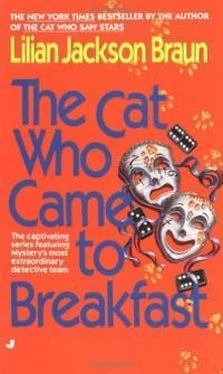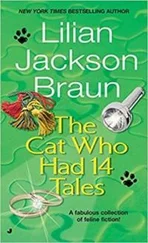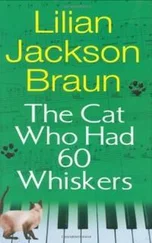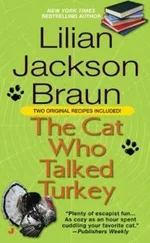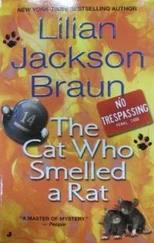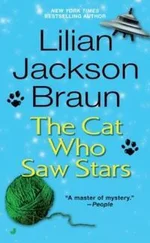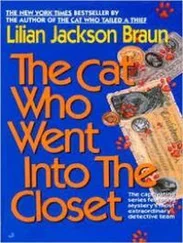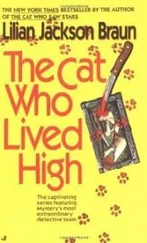"When I charted the name you gave me, the final digit was two, and instinct told me you were not a two type! I had a feeling that you are a five!... So now, if you'll give me a moment, I'll chart your birth name." As she scribbled in a notebook, she mumbled to herself, "Merlin reduces to eight . .. add three for James and three for Qwilleran ... for a total of fourteen . .. which reduces to five.... I knew it! You're a five!" she cried in triumph. "Is that good or bad?"
Excitedly she said, "It means you like freedom, adventure, and change. You've probably traveled extensively, because you're adaptable and have a lively curiosity about new places and new people. And you have ingenuity, which must be useful in your work."
"In all modesty," Qwilleran said, "I must say you've got it right. But how did you know the previous number was wrong? You don't know me that well."
"It's your aura," she said seriously. "You have the aura of a five."
"And what is your digit?"
"I'm a seven, which happens to be the same as your male cat. In charting them I came upon an astounding fact. Kao K'o Kung adds up to seven, and so does Koko. In the case of Yum Yum and Freya, each name comes out to the same digit: one. That means she's patient and independent, with strong willpower. Koko is aristocratic, scientific, and mentally keen, but rather secretive."
"Remarkable!" Qwilleran said. Pensively he devoured a bowl of gumbo, while his guest nibbled half a chicken sandwich without mayonnaise. Gradually he led her into a discussion of cooking herbs, then medicinal herbs, and then toxic herbs.
"The islanders would probably know about poisonous plants," she said. "They make their own folk medicines. Have you ever been to the Dark Village?"
"Is that what the natives call Providence Village?"
"Yes, and it's a fascinating place. My father used to drive us through the village. If you'd like to rent a carriage after lunch, I could drive."
"Is it true they resent strangers?"
"Ordinarily, but we were always quiet and respectful of their privacy. The islanders liked my father. He'd talk to the fishermen on the beach and buy some of their catch."
She lapsed into a thoughtful silence and he left her alone with her memories for a while. Suddenly she said, "Qwill, would you call me Liz? No one but my father ever called me that. He was my best friend and the only one who ever really listened to me."
"I'd be honored ... Liz," he said. "How long has your father been gone?"
"Six years, and I still feel lonely. I have no rapport with my mother. William and Ricky are good brothers, but they have their own families and their own life."
"What about Jack?"
"We don't get along," she said sharply. "When we were growing up, he used to torment mepaint moustaches on my dolls and glue the pages of my favorite books together."
"Did your parents let him get away with that?"
"Mother excused him, saying he was naturally playful and didn't mean any harm, and Fatherwell . .. Father never tried to argue with her. You see, Qwill, Jack was such a beautiful boy that he could get away with anything! He's lost his looks now, from too much partying."
"Does Jack have a profession?"
"Marriage!" she said acidly. "He's been divorced three times, and he's only twenty-six. Mother says she doesn't care how many women he has, but why does he have to marry them all? It's like an addiction. Did you ever hear of such a thing? It's not a subject the family likes to discuss, but I'm sure he's married again and wants to get out of it. Whenever Jack spends a few weeks at home, he has an ulterior motive. He's been married to a rock singer, a figure-skater (she was nice), and an Italian actress."
"Some day he'll marry a librarian and live happily ever after," Qwilleran said.
Liz laughed a little. "I'm doing all the talking, Qwill. Tell me about you. Where do you live?"
"I live in a converted apple barn in Pickax City, population 3,000. I used to write for large metropolitan dailies, but now a friend of mine publishes the small local newspaper. I write for it and get involved, somewhat, with small-town life."
"You seem happy," Liz said with a touch of envy.
"I've achieved contentment, I think. I have friends, and I'm writing a book."
"I'm not happy," she said with bitterness. "You were right when you said I need a place of my own. When I'm at home, I lose all my spirit and ambition and appetite."
"How do you account for that?" he asked gently, although he was eager for particulars. Some day he would actually write that book, and he was always scrounging for material.
"Mother wants to direct my life, choose my friends, and make my decisions. After a while one just ... gives up!... There! That's all I'm going to say about it."
"Let's visit the Dark Village," Qwilleran said.
He rented a two-wheeled cart, and they headed toward the east beach with Liz at the reins. It was an expanse of pebbles with picnic tables and rubbish containers at intervals. A few tourists were sunning on beach towels or hunting for agates or sharing picnic lunches with stray cats. Qwilleran said, "I've seen feral cats everywhere except at The Pines."
"No," she said sadly. "They know they're not wanted."
After a while a rutted road forked to the left and plunged into the woods. The hush was almost oppressive.
"The Dark Village," Liz whispered. "Can't you feel its spell?"
Ancient trees spread a dense canopy of branches over the road. There were windswept cedars twisted into grotesque shapes and gnarled oaks with trunks five feet in diameter, crusted with lichens. As the horse plodded through the ruts, the wheels of the rented gig creaked noticeably; otherwise, there was a lonely silence. A ramshackle hut or collapsed roof might be seen in the woods, but there was no sign of humanity. Deeper and deeper into the forest the road followed a tortuous path between the arboreal giants. Qwilleran had to remind himself to take a deep breath occasionally.
Farther on, scattered habitations began to appear pathetic shelters nailed together from fragments of wrecked ships or structures swept away from some distant shore long ago. Some of them had small yards fenced off with misshapen pickets of driftwood, enclosing two or three crude tombstones. Yet, there was evidence of the living as well as the dead. A few pieces of clothing hung forlornly on a clothesline; an old dog slept on a doorstep; hens pecked in the road, and a goat nibbled weeds in a front yard. Once, a wild cat dashed across the road, dodging the horse's hooves. Some children, playing in a yard, rushed out of sight when the cart approached. Occasionally there was a glimpse of movement in a window, as someone peered out at the strangers. Somewhere a rooster crowed.
At one point the road widened slightly, and there was a small but well-built schoolhouse with outhouses for boys and girls; the siding was government-issue aluminum. Nearby, a weatherbeaten structure looked like the ghost of an old general store; two gaunt old men sat on a bench in front and glared at the cart as it trundled past. One other building made a brave showing with white paint but only on the front; there was a cross above the door.
Читать дальше
